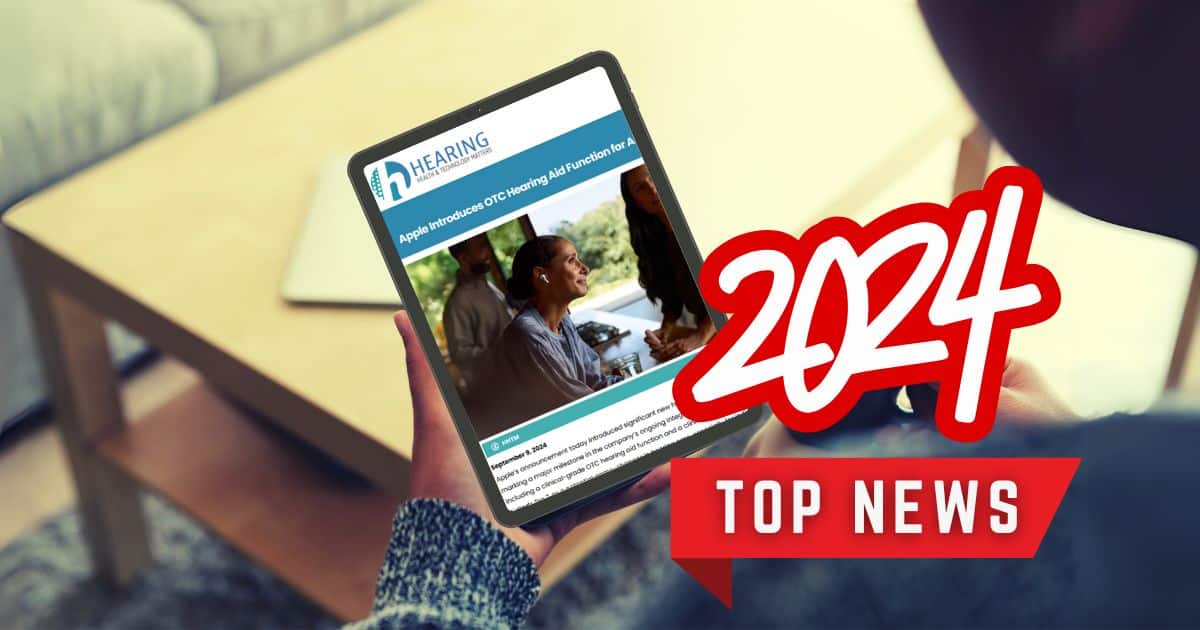In 2024, the world of hearing healthcare continued to evolve with groundbreaking research, innovative technologies, and meaningful policy discussions. From significant advancements in gene therapy and regenerative treatments to the growing role of consumer tech in hearing solutions, this year brought transformative developments that are shaping the future of hearing health.
Below, we present the Top 10 Most Read news stories of 2024, offering a snapshot of the key milestones and insights that defined an extraordinary year in hearing healthcare.
Top 10 Hearing News Stories of 2024
1) Eli Lilly: Gene Therapy Clinical Trial Restores Hearing in First Participant Within 30 Days
In January, Akouos, a subsidiary of Eli Lilly, announced that the first participant in their Phase 1/2 AK-OTOF-101 gene therapy trial experienced restored hearing within 30 days of administration. The 11-year-old participant, who had over a decade of profound hearing loss, achieved hearing thresholds within the normal range at some frequencies, with no serious adverse events reported.
2) Apple Introduces OTC Hearing Aid Function for AirPods Pro 2
In September, Apple announced that the AirPods Pro 2 would include over-the-counter (OTC) hearing aid functionality, allowing users with mild to moderate hearing loss to conduct a clinically validated hearing test and personalize their hearing experience directly through the earbuds following a simple software update. This advancement positions the AirPods Pro 2 as a significant step toward making hearing assistance more accessible, blending everyday technology with clinically validated hearing aid capabilities to reach a broader audience.
3) Study Shows Microplastics Can Cause Hearing Loss and Balance Issues in Mice
A study published in the Journal of Hazardous Materials in July found that exposure to polyethylene microplastics can lead to hearing loss and balance issues in mice. The research found that these microplastics can accumulate in the inner ear, causing functional impairments and triggering molecular pathways associated with inflammation and cell death.
4) Newly Developed Surgical Method Promises to Transform Hearing Loss Cell Therapy
Rinri Therapeutics, a University of Sheffield spinout, has developed a less invasive surgical technique to deliver regenerative cell therapy directly to the auditory nerve via the inner ear’s round window. This method will be utilized in upcoming human trials for Rincell-1, their lead product aimed at treating hearing loss by restoring nerve connections between the inner ear and the brain.
5) Study Links Noise-Induced Hearing Loss to Zinc Levels in the Inner Ear
A study published in the Proceedings of the National Academy of Sciences in February, revealed that excess zinc in the inner ear following exposure to loud noise contributes to noise-induced hearing loss. Experiments in mice demonstrated that drugs acting as molecular sponges to trap this excess zinc can either restore lost hearing or prevent hearing loss when administered before exposure to loud sounds, suggesting a potential new treatment avenue for humans.
6) Sound Pharmaceuticals Completes Phase 3 Trial of SPI-1005 for the Treatment of Meniere’s Disease
Sound Pharmaceuticals has completed its Phase 3 clinical trial of SPI-1005, an oral anti-inflammatory drug containing ebselen, for the treatment of Meniere’s Disease. The trial demonstrated significant improvements in hearing loss and speech discrimination among participants, marking a potential breakthrough for a condition that currently lacks FDA-approved medical treatments.
7) Apple Hearing Study Unveils New Insights on Tinnitus in Landmark Survey
In March, Apple and the University of Michigan released findings from the Apple Hearing Study, analyzing data from over 160,000 participants to better understand tinnitus prevalence, causes, and management strategies. The study revealed that 77.6% of participants have experienced tinnitus, with noise exposure and stress identified as key contributors, highlighting the need for improved treatment approaches.
8) New Study Questions Benefits of High-Dose Steroids for Sudden Hearing Loss
Germany researchers examined the effectiveness of high-dose glucocorticoids for sudden sensorineural hearing loss (SSNHL) across 39 sites in Germany. Led by Prof. Stefan Plontke, the trial found no significant difference in hearing recovery between high-dose and standard-dose steroid treatments, while higher doses were associated with more adverse effects, underscoring the need for further placebo-controlled research.
9) Who Needs OTC Hearing Aids? New Research Offers Demographic and Audiological Breakdown of U.S. Adults Most Likely to Benefit
A study led by Dr. Larry E. Humes from Indiana University analyzed data from recent NHANES surveys to profile U.S. adults with perceived mild-to-moderate hearing loss, the primary target group for OTC hearing aids. The findings estimate that around 49.5 million adults fall into this category, with prevalence notably higher among older adults, males, and those with lower socioeconomic status—highlighting critical opportunities to improve hearing healthcare accessibility and inform future policy decisions.
10) Academy of Doctors of Audiology Launches Audiology 2050 Initiative
During the AuDacity 2024 Conference, the Academy of Doctors of Audiology (ADA) announced the launch of the Audiology 2050 Initiative. This strategic roadmap focuses on modernizing the scope of practice, establishing standardized clinical guidelines, and advocating for legislative changes to enhance patient care and professional standards in audiology. In a subsequent interview on This Week in Hearing, ADA President, Dr. Jason Leyendecker, and President-Elect, Dr. Amyn Amlani, provided further insights into the initiative, discussing its goals and the steps required to achieve them.
Looking Ahead…
As 2024 comes to a close, the advancements and discoveries in hearing healthcare have set the stage for an exciting and impactful future. From groundbreaking research to cutting-edge solutions, these stories underscore a year of significant progress and promise for individuals with hearing loss and the dedicated clinicians who support them.
We look forward to continuing to share the latest developments shaping the future of hearing health in the year ahead.






